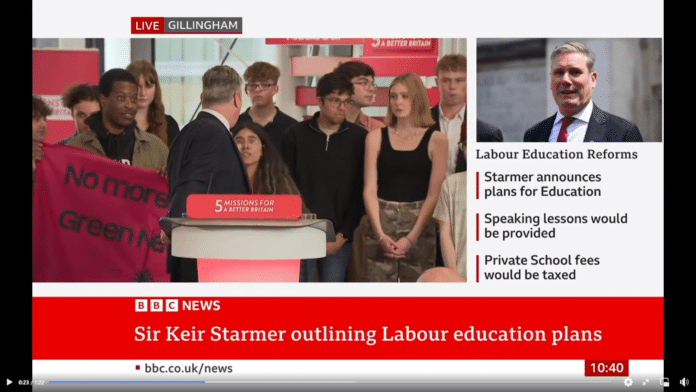The man is a despicable Tory intruder in to a party that is supposed to liberate us from the establishment not force us get on our knees and suck until our life expires.
Thankfully, some people are brave enough to confront him but many just open wide.
Starmer’s U turns
Keir Starmer, the leader of the Labour Party, is determined to become the prime minister and is willing to make whatever changes necessary to bring Labour into power. This includes reversing his stance and breaking promises on significant policy commitments when the political climate shifts.
Starmer and his Shadow Chancellor, Rachel Reeves, have been emphasising the importance of fiscal responsibility and using recent economic turmoil, such as skyrocketing prices and high interest rates, as reasons to modify their plans.
However, this willingness to change direction has drawn criticism, with Starmer being labelled as untrustworthy and someone who doesn’t keep his promises.
Whether one views this adaptability as sensible or untrustworthy, it is worth recapping the policy pledges that Keir Starmer has abandoned, ranging from tuition fees to green investment.
One of Labour’s prominent promises was to eliminate tuition fees, which was a central part of their manifestos in the 2017 and 2019 elections. Starmer, during his bid for party leadership in 2020, also made it one of his key pledges. However, it seems that this commitment is now likely to be abandoned due to the changed financial situation. Starmer mentioned the estimated cost of at least £6 billion per year as a reason for the shift and promised to find a “fairer solution” while maintaining the majority of his other pledges.
Another significant pledge was to increase income tax for the top five percent of earners. This promise held great importance for Starmer, as it was the first sentence of his first pledge. However, he has hinted at moving away from this commitment, citing the current high tax burden and comparing it to the levels during World War II.
Regarding the nationalisation of public services, Starmer pledged that they should be in public hands and not generate profits for shareholders. This included supporting common ownership of rail, mail, energy, and water, as well as ending outsourcing in the NHS, local government, and justice system. However, Labour’s stance on nationalisation has shifted, with Rachel Reeves confirming that the policy had been scrapped for all sectors except rail. Starmer also suggested that significant progress could be made in improving water quality through stronger regulation and accountability, without resorting to nationalisation.
On the issue of freedom of movement, Starmer initially pledged to defend it as the UK left the EU. However, he later abandoned this stance, stating that freedom of movement was a red line for him and would not return under his government. He explained that he did not want to overturn the Brexit deal, and his support for freedom of movement was conditional on ongoing negotiations and the mood of both the UK and the EU.
Labour’s “green prosperity plan,” which aimed to invest £28 billion per year into the green economy until 2030, has also been adjusted. Instead of immediate implementation, Labour plans to gradually reach that funding level by the midpoint of their first term in office. This modification is attributed to the economic instability caused by the Conservatives, as claimed by Rachel Reeves.
Finally, Starmer made a high-profile promise to block new oil and gas exploration in the North Sea as part of Labour’s transition to renewable energy. However, it was later revealed that a Labour government would not prevent drilling or revoke licenses for the Rosebank oil and gas field. A Labour spokesperson clarified that their policy remained unchanged, stating that they would not grant licenses for new fields but would allow existing licensed operations to continue.
In summary, Keir Starmer’s pursuit of becoming prime minister has led to shifts in his policy pledges, with some being abandoned or modified based on changing circumstances and financial considerations. While Labour insists that the core principles of their agenda remain intact, critics argue that these changes undermine Starmer’s credibility and trustworthiness.
Join us in helping to bring reality and decency back by SUBSCRIBING to our Youtube channel: https://www.youtube.com/channel/UCQ1Ll1ylCg8U19AhNl-NoTg and SUPPORTING US where you can: Award Winning Independent Citizen Media Needs Your Help. PLEASE SUPPORT US FOR JUST £2 A MONTH https://dorseteye.com/donate/







